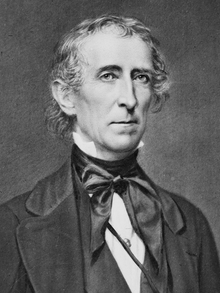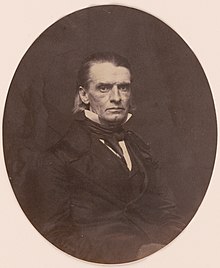
Bellefontaine Cemetery is a nonprofit, non-denominational cemetery and arboretum in St. Louis, Missouri. Founded in 1849 as a rural cemetery, Bellefontaine is home to a number of architecturally significant monuments and mausoleums such as the Louis Sullivan-designed Wainwright Tomb, which is listed on the National Register of Historic Places.

Hollywood Cemetery is a historic rural cemetery located at 412 South Cherry Street in the Oregon Hill neighborhood of Richmond, Virginia. It was established in 1847 and designed by the landscape architect John Notman. It is 135-acres in size and overlooks the James River. It is the only cemetery other than Arlington National Cemetery that contains the burials of two United States Presidents, James Monroe and John Tyler.

Green Mount Cemetery is a historic rural cemetery in Baltimore, Maryland, United States. Established on March 15, 1838, and dedicated on July 13, 1839, it is noted for the large number of historical figures interred in its grounds as well as many prominent Baltimore-area families. It retained the name Green Mount when the land was purchased from the heirs of Baltimore merchant Robert Oliver. Green Mount is a treasury of precious works of art, including striking works by major sculptors including William H. Rinehart and Hans Schuler.

William "Extra Billy" Smith was a lawyer, congressman, the 30th and 35th Governor of Virginia, and a major general in the Confederate States Army during the American Civil War. On his appointment in January 1863, at 65, Smith was the oldest Confederate general to hold field command in the war.

Lexington Cemetery is a private, non-profit 170-acre (69 ha) rural cemetery and arboretum located at 833 W. Main Street, Lexington, Kentucky.

The U.S. state of West Virginia was formed out of western Virginia and added to the Union as a direct result of the American Civil War, in which it became the only modern state to have declared its independence from the Confederacy. In the summer of 1861, Union troops, which included a number of newly formed Western Virginia regiments, under General George McClellan drove off Confederate troops under General Robert E. Lee at the Battle of Philippi in Barbour County. This essentially freed Unionists in the northwestern counties of Virginia to form a functioning government of their own as a result of the Wheeling Convention. Before the admission of West Virginia as a state, the government in Wheeling formally claimed jurisdiction over all of Virginia, although from its creation it was firmly committed to the formation of a separate state.
A political general is a general officer or other military leader without significant military experience who is given a high position in command for political reasons, through political connections, or to appease certain political blocs and factions.
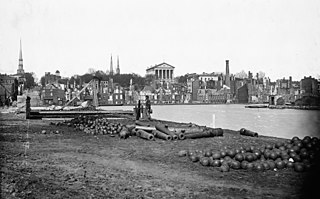
Richmond, Virginia, served as the capital of the Confederate States of America during the American Civil War from May 8, 1861, hitherto the capital had been Montgomery, Alabama. Notwithstanding its political status, it was a vital source of weapons and supplies for the war effort, as well as the terminus of five railroads, and as such would have been defended by the Confederate States Army at all costs.
Robert Latané Montague was a prominent Virginia lawyer, politician and judge, before and after the American Civil War. He twice won election to the Virginia House of Delegates, and also served during the Virginia Secession Convention of 1861, as Lieutenant Governor of Virginia, and in the Second Confederate Congress from. His son Andrew Jackson Montague became Governor of Virginia and a U.S. Congressman, and grandson Robert Latane Montague rose to become a general in the U.S. Marine Corps after receiving the Distinguished Service Cross in World War I.
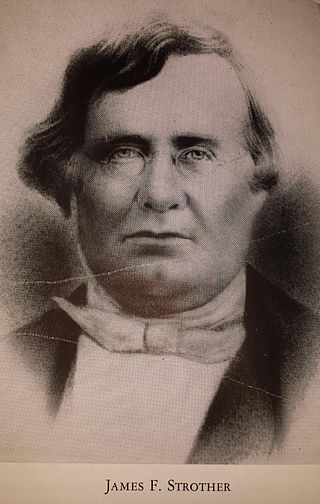
James French Strother was a nineteenth-century American politician and lawyer from a noted Virginia political family of lawyers, military officers and judges. He was the grandson of French Strother who served in the Continental Congress and both houses of the Virginia General Assembly, son of Congressman George Strother and grandfather of Congressman James F. Strother.

John Mercer Patton was a nineteenth-century politician and lawyer from Virginia. Patton served in the United States House of Representatives representing two different Virginia Districts and was the acting governor of Virginia for twelve days in 1841.

Peter Augustus Porter was a lawyer, politician, and member of the Breckinridge family and a Union Army colonel in the American Civil War. He died in the Battle of Cold Harbor.

Loudon Park Cemetery is a historic cemetery in Baltimore, Maryland. It was incorporated on January 27, 1853, on 100 acres (40 ha) of the site of the "Loudon" estate, previously owned by James Carey, a local merchant and politician. The entrance to the cemetery is located at 3620 Wilkens Avenue.
Events from the year 1862 in the United States.

Events from the year 1864 in the United States.
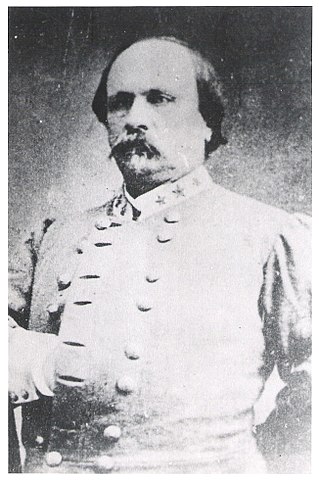
William Henry Wallace was a Confederate States Army brigadier general during the American Civil War. Before the Civil War, he was a planter, newspaper publisher, lawyer and South Carolina legislator in 1860 who supported the state calling a secession convention. He served in the Eastern Theater of the American Civil War, including service as a brigade commander in the Army of Northern Virginia. After the Civil War, he was a lawyer, planter, South Carolina legislator and circuit judge.
William Henry Harman was a brigadier general in the Virginia militia and colonel in the Confederate States Army during the American Civil War, who was killed in action during the Battle of Waynesboro, Virginia, on March 2, 1865.
Pendleton is both a surname and a given name. Notable people with the name include:

Charles James Faulkner was a politician, planter, and lawyer from Berkeley County, Virginia who served in both houses of the Virginia General Assembly and as a U.S. Congressman.









